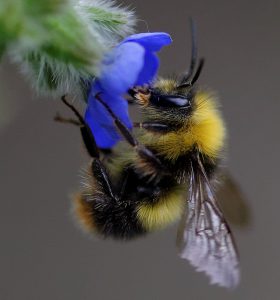Exposure to neonicotinoid pesticides negatively impacts bees
 Photo Credit: Adam Gold
Photo Credit: Adam Gold
In 2017 a series of high profile scientific papers were published in the scientific journal, Science, soundly confirming that neonicotinoid insecticides negatively affect insect pollinators. One study demonstrated that honey bee colonies in Canada’s corn growing regions exposed to neonicotinoids for the majority of their active season – three to four months – suffered increased bee mortality, lower social immunity and higher queen loss. Another study using large field experiments in Hungary, found that honey bees and wild bees were negatively affected by neonicotinoid exposure, with honey bee colonies experiencing declines of almost 25% after overwintering and successful reproduction dropping in wild bees. A final study sampled honey from across the globe and showed that 75% of their samples were contaminated with neonicotinoid pesticides at levels known to be dangerous to bees.


